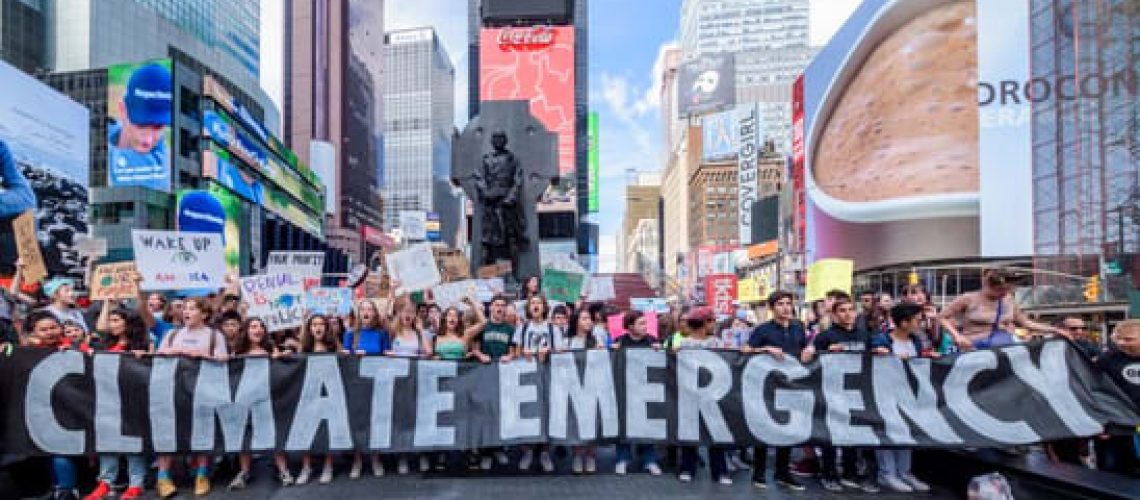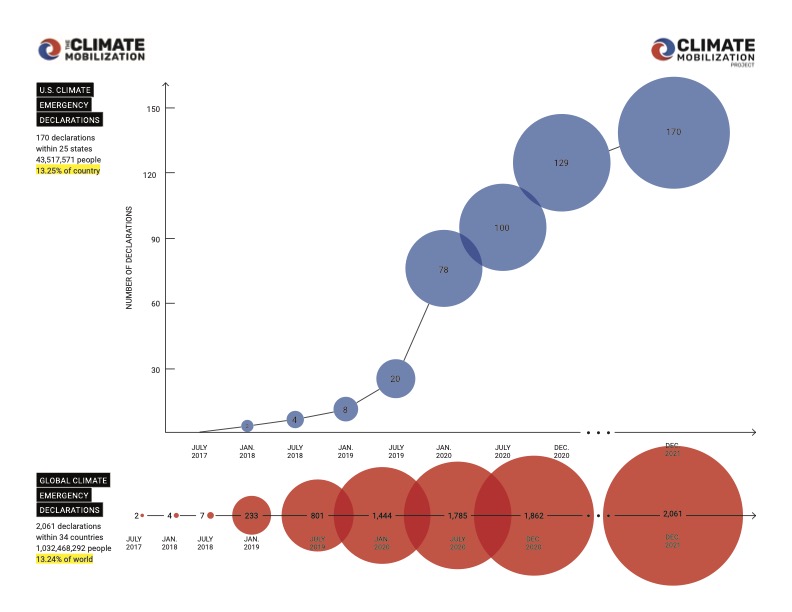By AriDy Nox (TCM Co-Leader and Director of Narrative Strategy) and Laura Berry (TCM Advisor and former Director of Research and Policy)
Climate activists across the United States rejoiced this week when the Washington Post reported that President Joe Biden was considering declaring a national climate emergency. After a disappointing outcome for federal climate investment proposals during budget negotiations in the Senate, and with deadly heat waves sweeping the U.S. and Europe, calls for President Biden to exercise his executive authority to take action on the climate emergency have grown harder and harder for the President to ignore.
But after a somewhat vague climate address, many are wondering if that is in fact what he intends to do. Though the President used a lot of language to indicate a national climate emergency declaration is still on the table, he stopped shy of what activists across the country have been pushing him to do for years: declaring climate change a national emergency.
Standing yesterday afternoon before Brayton Point, a retired coal-fired power plant turned offshore wind manufacturing facility in Somerset, Massachusetts, President Biden announced a series of new executive actions the federal government will take to “address the climate emergency,” including additional funding to protect communities from extreme heat, a new federal guidance to support low-income families facing rising energy bills, and increased efforts to boost domestic offshore wind energy.
Yet President Biden, once again, stopped short. Wildfires rage, extreme heat threatens over 100 million people, and federal climate policy seems increasingly out of reach: What more will it take for Biden to act?
The “long emergency” of Biden’s climate policy
Unfortunately, Biden’s continued resistance doesn’t actually come as much of a surprise to long-time climate advocates. His refusal to take action at the speed and scale necessary to protect communities from the impacts of climate disruption (especially frontline communities already suffering from the climate crisis) is almost expected at this point. From his weak climate platform during the 2020 Presidential election, to allowing the major climate provisions to be stripped from his signature Build Back Better platform in the bipartisan infrastructure bill in 2021, the image of Biden as an FDR-like champion for climate justice was tarnished early on during his term as President.
Yet the most recent instance of nearly three decades of federal climate policy failure has also been rooted in the actions of one individual: Senator Joe Manchin (D-WV), who — despite his direct ties to the fossil fuel industry — represents a key Democratic vote in a 50-50 Senate and a consistent opponent to any new federal climate spending proposed by the Biden administration. So when Senator Manchin once again rejected the inclusion of any climate mitigation measures in a proposed budget reconciliation package last week, outraged climate advocates mounted a new effort in an ongoing pressure campaign urging Biden to declare a climate emergency and take executive action to limit fossil fuel extraction and massively expand domestic renewable energy. In response, Biden released a statement pledging he would take strong executive action if the Senate failed to take action on climate change and strengthening domestic clean energy.
But that ultimately led only to his disappointing speech yesterday at Brayton Point.
Nearly two years into his administration, Biden’s “whole-of-government” approach to climate change is ultimately too little, too late. Many climate groups and Democrats saw last week’s budget reconciliation negotiations as a “now or never” moment for federal climate policy ahead of the November midterm elections, and were looking for President Biden to truly fight on behalf of the frontline and marginalized groups already suffering from the impacts of climate devastation.
It’s clear that Biden cannot afford not to use the full extent of his executive authority to limit climate harm. With the Supreme Court facing a crisis of legitimacy and Congress proving itself completely unreliable, Biden must take the opportunity to be the Climate Mobilization President we need – a leader who will support local communities across the country and build the Just Transition to a safe climate future. Whether or not he takes up this mantle, climate activists are ensuring that we come together to achieve these goals. The real question is whether or not the Biden administration wants to be part of this necessary and inevitable change.
It’s still a climate emergency, whether Biden declares it or not
While Biden’s refusal to declare a climate emergency during his speech yesterday represents an abysmal failure to live up to his own rhetoric, a national climate emergency declaration remains one tool in a large policy toolbox that could make up a federal climate mobilization response. Declaring a climate emergency would certainly provide President Biden with a number of additional statutory powers to take critical actions to combat climate change that would only be possible at the federal level. Under an emergency declaration, President Biden could — and should — reinstate the ban on U.S. exports of crude oil, halt offshore drilling, expand supply from critical domestic industries like batteries or solar panels, and implement increased restrictions on greenhouse gas emissions from transportation. Legal analysis on emergency powers from the Center for Biological Diversity has also suggested that under a federal climate emergency declaration, Biden could potentially redirect existing military funding to supporting the construction of renewable energy projects.
While Climate Mobilization and over 1,200 climate groups have signed on to the People vs. Fossil Fuels campaign supporting a national climate emergency declaration, declaring a national climate emergency alone would not be enough to guarantee that President Biden would exercise those powers in a way that centers the needs of frontline and marginalized communities, or be rooted in the principles of Just Transition. The abuse of executive authority during the Trump Administration also shows us that a national climate emergency declaration should not be treated as a magic wand for national climate policy — and a climate emergency declaration under existing laws like the National Emergencies Act and International Emergency Economic Powers Act must limit the risk of executive overreach. Utilizing executive authority would facilitate fast, wide-ranging changes necessary for our cause, but it would have to be done in a way where Biden could be held accountable to the demands of frontline communities, especially Indigenous organizers who are the original caretakers of this land.
That being said, Biden’s unwillingness to declare a climate emergency is symbolic of his continued refusal to show true climate leadership in a time of crisis, especially as many key pathways to reducing national greenhouse gas emissions still remain open to him. Beyond the additional powers that would be granted to him under a climate emergency declaration, President Biden already has the authority to take significant action on climate disruption, such as by halting federal fossil fuel leasing and infrastructure permitting, without the support of Congress — yet has failed to do so. While President Biden has utilized the Defense Production Act to support increased domestic renewable energy manufacturing, he could expand such efforts to drive a coordinated and widespread expansion of renewable energy infrastructure across the country — a key opportunity to target federal investments in frontline communities and communities of color who have been impacted most by fossil fuel extraction and climate devastation.
But as this critical window of opportunity to pass federal climate legislation closes, the pathway for Biden to lead the country away from even more dangerous and deadly levels of planetary heating is narrower and more treacherous than ever.
Now more than ever, it’s up to us to win a Climate Mobilization
We know that relying on national elected officials to take action won’t win us the scale of society-wide action that climate justice requires — but that doesn’t mean we’re giving up. We support the continued push to get Biden to do the necessary thing and we recognize how much we have already accomplished without a national declaration. In the absence of federal climate action, the Climate Emergency movement and climate activists across the U.S. have already mobilized millions of people across the country to take action on the climate emergency at the local and state level. Since 2016, over 200 governments have passed climate emergency declarations in cities and states across the U.S., and an ever-growing movement for emergency-speed action towards a Just Transition is now fighting for local climate emergency programs in communities across the U.S. From Hawaii to Maine, we’re the ones already winning the kind of climate mobilization we need.
In Acton, MA, Climate Mobilization has directly supported climate emergency activists who have mobilized renters across the city to ensure that access to safe housing, electric vehicle charging, and climate justice were core tenants of the Acton Climate Action Plan. Across Sonoma County, CA, Climate Mobilization is working with a local transit riders’ union and intersectional coalition of climate and community organizers to drive efforts to establish a fare-free bus pilot program and massively expand public investment in low-carbon transit infrastructure in support of transportation justice for low-income and marginalized residents. We applaud other efforts across the country like those in Ithaca, NY, community members and local government officials are driving forward a city-wide Green New Deal effort to achieve carbon neutrality by 2030 through explicitly prioritizing marginalized communities and reducing historic inequity through equitable building electrification programs and centering of local community voices throughout decision-making.
In 2022, our collective future depends on us. A national climate emergency declaration is an invaluable tool and we challenge President Biden to finally use it. But it isn’t our only pathway to a safe future. No matter what, we need to organize and build power in our own local communities to demand equitable policies that eliminate carbon emissions as quickly as possible — and ultimately win the society-wide Just Transition we need to ensure a safe climate future for all of us. In his address, Biden urged us to work together on climate and we will. With or without him, we are mobilizing for a better future. Join us!
Special thanks to Climate Emergency Fund who has been the leading funder of the Climate Emergency Declaration campaign, supporting The Climate Mobilization and other groups over the past 3 years.

















